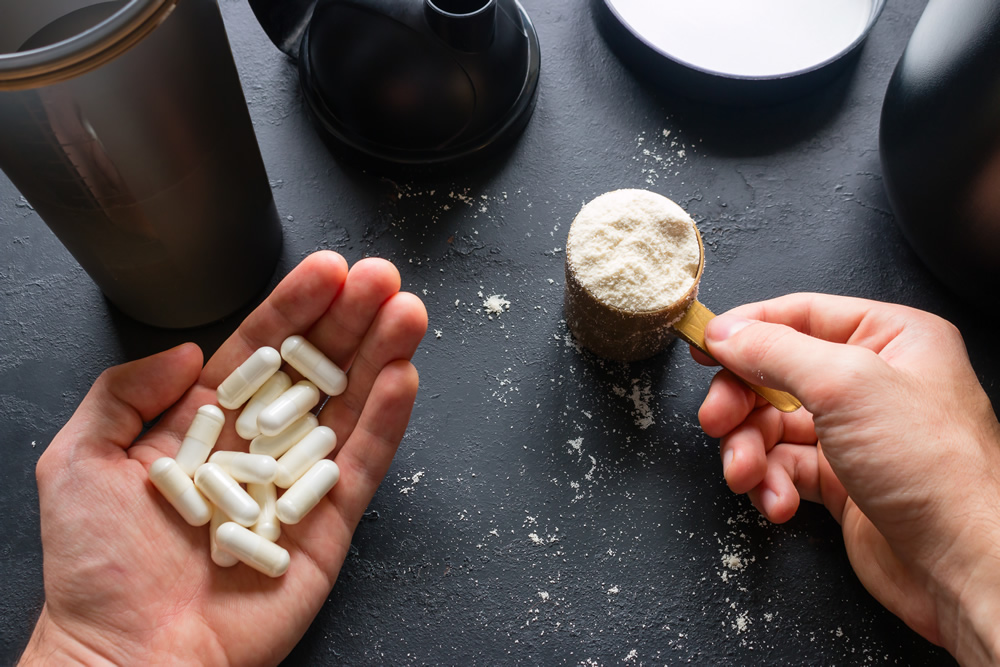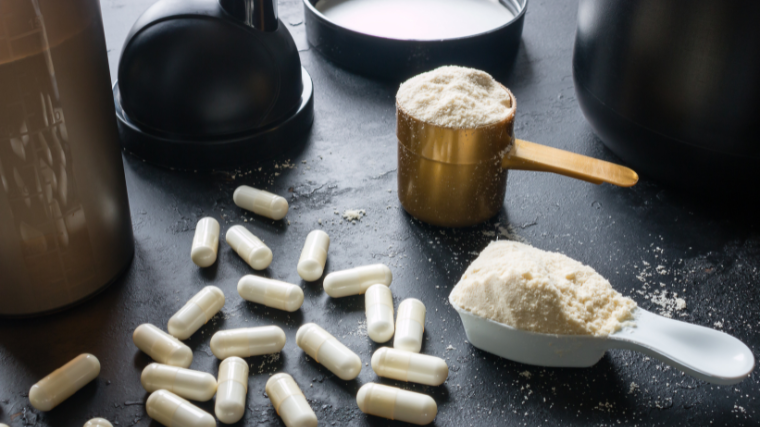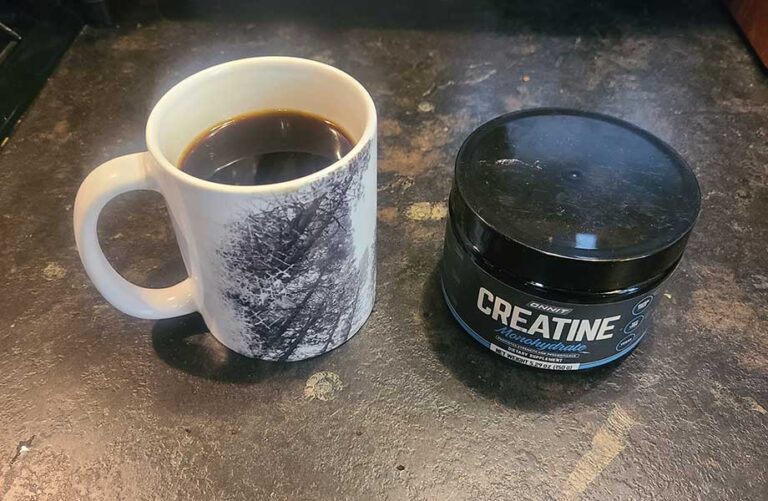As I sat at my kitchen table one morning, contemplating my daily routine, I couldn’t help but wonder if there was a way to merge my love for a soothing cup of tea with my desire to optimize my workouts. You see, I’m no stranger to the fitness world, and creatine has been a trusted ally in my pursuit of strength and stamina. But the idea of combining creatine with my cherished tea ritual seemed both novel and enticing.
However, I discovered surprising possibilities and an exciting synergy that could potentially redefine my approach to health and wellness.
Yes, you can mix creatine with tea without it affecting the effectiveness of the creatine. While some suggest that warm water or tea might enhance its effectiveness, there isn’t any scientific research to back up this claim. So, feel free to enjoy your creatine-infused tea without worries about its impact on your supplement’s potency.
Let’s go on this journey together and realize the endless possibilities of tea’s creatine.
Optimizing Creatine and Caffeine Synergy: Best Practices

Prioritize Hydration: Maintaining proper hydration is paramount. Ensure you consume an ample amount of water throughout the day. A reliable indicator of hydration is the color of your urine, which should ideally be a pale yellow hue.
Moderate Caffeine Consumption: Recognize that caffeine sensitivity varies from person to person. While tolerance levels differ, it’s generally safe for most individuals to limit their daily caffeine intake to around 400 mg (as per a reputable source).
Mind Your Timing: Be vigilant about the timing of your caffeine consumption. To avoid potential sleep disturbances, cease your caffeine intake at least 6 hours before bedtime. It’s advisable to schedule your caffeine and workout sessions during the earlier part of the day or in the early afternoon.
Consider Decaf Alternatives: If you’re concerned about the stimulating effects of caffeine later in the day, contemplate switching to decaffeinated beverages. Decaf options contain significantly less caffeine, making them a wiser choice if you enjoy coffee or tea in the afternoon or evening.
Unlocking the Potential: Combining Creatine and Tea for Performance Enhancement
Is the fusion of creatine and tea a performance booster or a cause for concern? The alliance between these two may hold the key to enhanced athletic prowess, but it also brings some considerations to the forefront.
Creatine’s Compatibility with Tea: The good news is that tea, with its cozy warmth, is a perfect vehicle for this supplement because creatine easily combines with warm liquids. Additionally, the combination of tea with creatine can change the flavor and make it more enjoyable.
Caffeine Conundrum: However, the caffeine lurking within tea may introduce a wrinkle into this partnership. Caffeine, known for its diuretic properties, could potentially interfere with creatine’s absorption and effectiveness. The combination of these two agents might elevate the risk of dehydration, especially if one is not adequately hydrated.
Hence, if you contemplate the amalgamation of creatine and tea, prudence dictates that you consider factors such as your age and health status. Seeking guidance from a fitness professional can illuminate the safest path toward your fitness goals.
Tea Varieties for Consideration:
Green Tea: The fusion of creatine and green tea can wield a formidable influence on energy production and muscle strength during your workouts.It is antioxidants and anti-diabetic properties complement creatine’s neuroprotective and anti-aging effects, possibly improving cognitive performance and preventing age-related illnesses. This combination is enticing due to the flavorful harmony, which features the soft earthiness of green tea and the subtle sweetness of creatine.
Black Tea: Replete with antioxidants beneficial for overall health, black tea emerges as an ideal companion for creatine, bolstering your fitness journey and performance.
Herbal Tea: Herbal teas, drawn from a multitude of herbs and plants, often tread the caffeine-free path. While they offer a flavor-packed and caffeine-averse alternative, their diverse ingredient profiles may introduce uncertainty regarding their interaction with creatine absorption.
Milk Tea: While it is generally suitable for creatine mixing, the wisdom of blending it with tea may be questionable. The combination of both may potentially diminish the overall antioxidant potency.
Harnessing Creatine-Tea Synergy: Benefits and Potential Pitfalls
In recent times, the trend of infusing creatine into tea has gained momentum. But what exactly are the advantages of this practice, and what potential drawbacks should you be aware of? Let’s explore the benefits first:
1. Enhanced Physical Performance:
Creatine when paired with tea can amplify physical performance, particularly during high-intensity exercises like weightlifting, sprinting, and leaping. The caffeine inherent in tea contributes by heightening alertness and focus, further augmenting performance in these demanding activities.
2. Muscle Mass Augmentation:
Consistent creatine supplementation may result in increased muscle mass and strength. In tandem, it consumption has shown correlations with greater muscle strength and improved muscle mass gains.
3. Cognitive Enhancement:
Creatine has demonstrated its prowess in enhancing cognitive performance, encompassing aspects of memory, attention span, and overall brain function. When combined with tea, which also boasts cognitive benefits, the effects on mental acuity may become even more pronounced.
4. Accelerated Recovery:
Post-workout recuperation can benefit from creatine’s ability to curtail muscle damage and inflammation. Tea, rich in antioxidants, may further contribute to reducing inflammation and supporting the recovery process.
5. Risk Mitigation for Disease:
Tea’s well-documented potential to reduce the risk of cardiovascular disease combines with creatine’s capacity to mitigate age-related ailments, creating a potent synergy for overall health.
Now, let’s delve into potential side effects when incorporating creatine into tea:
1. Gastrointestinal Distress:
For some individuals, creatine supplementation can trigger gastrointestinal discomfort, encompassing symptoms such as stomach cramps, nausea, and diarrhea. Adding creatine to tea might exacerbate these digestive issues.
2. Dehydration Concerns:
When creatine is consumed, it might cause water retention, which increases the risk of dehydration. The risk of it may increase if caffeine-containing tea is also consumed.
3. Kidney Health Considerations:
While current research suggests that creatine supplementation is unlikely to cause kidney damage, the introduction of creatine to tea may raise concerns, particularly in individuals with pre-existing kidney conditions.
4. Potential Headaches:
Some individuals may experience headaches as a result of creatine supplementation. The inclusion of it in tea might heighten the likelihood of experiencing headaches.
5. Sleep Disruptions:
Consuming it mixed with tea before bedtime can lead to insomnia or sleep disturbances for some individuals. Assessing the impact of creatine on sleep patterns is advisable.
6. Allergic Reactions:
Allergic reactions to creatine can occur in certain individuals. Combining creatine with tea may elevate the risk of an allergic response.
Crafting the Perfect Blend: Mixing Creatine with Tea
Achieving the perfect fusion of creatine and tea requires finesse. Here’s your step-by-step guide to the harmonious marriage of these two elements:
1. Tea Selection:
Begin by carefully choosing a tea variety that complements the flavor of creatine, ensuring it doesn’t overpower this valuable supplement.
2. Tea Preparation:
For loose tea leaves enthusiasts, employ a strainer or infuser. Let the leaves steep in hot water for several minutes to extract the full essence of the tea. Alternatively, if you opt for tea bags, immerse them in hot water and allow them to steep for the appropriate duration.
3. Creatine Integration:
After you’ve meticulously prepared your tea, it’s time to introduce creatine into the equation. The recommended creatine dosage typically ranges from 3 to 5 grams daily, divided into multiple servings throughout the day. To execute this seamlessly, blend it with 200 to 230 milliliters of your freshly brewed tea.
4. Stirring Mastery:
Stir the mixture with precision, ensuring that the creatine fully dissolves into the tea. Proper dissolution guarantees an even distribution of the supplement’s benefits throughout your beverage.
5. Optional Method:
Lastly, you can choose to make a concentrated solution by combining creatine powder with a small amount of water as a second option. You may then easily add this concentrated creatine solution to your tea, giving you more control over the blending procedure.
Maximizing Creatine Intake for Enhanced Body Strength

1. Recommended Dosage:
To bolster your muscle cells’ energy supply and enhance exercise performance, the recommended daily dose of creatine falls in the range of 3 to 5 grams. The tried-and-true form of creatine is creatine monohydrate, renowned for its effectiveness. This versatile supplement can be incorporated into various products such as energy bars, capsules, tablets, or beverages.
2. Fluid Accompaniment:
When consuming it, make sure accompanied by an adequate amount of fluids. For instance, you can dissolve 3 grams of creatine monohydrate in a glass of water. This facilitates absorption and optimizes its effectiveness.
3. Powdered Creatine Monohydrate:
Creatine monohydrate is commonly available in powdered form, meant for dissolution in water or juice. Warm liquids, including tea, expedite the dissolving process. However, even in cold water or cold beverages, creatine monohydrate retains its efficacy with a bioavailability exceeding 95 percent.
Further, consider combining it with sugary drinks or meals, as the presence of insulin can enhance creatine absorption. Nonetheless, it’s equally effective without the need for excessive simple carbohydrate consumption.
4. Creatine and Caffeine Interaction:
Speculation surrounds the potential interaction between caffeine and creatine. While some research remains inconclusive, experiments with caffeine dosages ranging from 5 to 7 mg per kilogram of body weight (equivalent to 350-490 mg for a 70 kg individual) have not shown adverse effects on creatine storage or muscle growth.
However, there might be implications for sprinting performance or explosive strength development. The advisability of caffeine consumption alongside creatine remains uncertain, but exercising caution by limiting heavy intake before intense workouts is prudent.
5. Capsules and Chewable Tablets:
Opting for creatine in capsule or chewable tablet form offers the same effectiveness. Capsules typically contain 750 mg each, while tablets typically provide around 1 gram. The daily dosage recommendation remains consistent at 3 to 5 grams per day.
6. Other Creatine Forms:
While creatine monohydrate reigns as the most extensively researched and reliable form, alternative creatine compounds such as creatine citrate or creatine pyruvate with improved solubility exist.
Therefore, they are less studied and may not be permitted in all regions, often carrying a higher price tag. Scientific evidence does not conclusively support their superiority over creatine monohydrate. For instance, creatine ethyl ester (CEE) does not break down into effective creatine components when ingested, rendering it less efficient compared to creatine monohydrate, which is almost entirely absorbed by the body.
FAQs
When Should You Take Creatine With Tea?
There is no specific recommended time of day for incorporating creatine with tea. It’s advisable to maintain a consistent daily creatine intake while avoiding teas high in caffeine, as they may interfere with absorption. The timing can be tailored to personal preference and fitness objectives.
Does Tea Have Creatine?
No, Tea does not naturally contain creatine, as it originates from plant sources that do not produce or stimulate creatine production in the body. Nevertheless, tea offers various benefits for muscle health and performance due to its abundance of antioxidants, polyphenols, and caffeine, which can positively impact factors such as inflammation, blood flow, and mental focus.
Can you add creatine to milk?
Yes, you can mix creatine with milk, but individuals with lactose intolerance should opt for lactose-free milk or a non-dairy alternative to avoid potential digestive issues. Another suitable option is to mix creatine with water or a non-dairy beverage.
Can you drink creatine in anything?
Yes, Creatine can be blended with various liquids, including water, juice, milk, or sports drinks, to improve its taste and palatability. However, it’s advisable to steer clear of beverages high in caffeine or acidity, as they may hinder creatine absorption.
Can I put creatine in my hot coffee?
Yes, you can incorporate creatine into a hot coffee beverage. Nonetheless, it’s essential to be aware that high temperatures may potentially degrade or break down the creatine molecule, potentially affecting its effectiveness.
Can you put creatine powder in hot food?
Yes, you can mix creatine powder into hot foods like oatmeal or soup. However, it’s essential to avoid extremely high temperatures, as prolonged exposure to heat may potentially degrade the creatine and reduce its effectiveness. Mixing it into warm, not scalding, foods is recommended.
Is Dry Scooping Creatine Bad?
Yes, Dry scooping creatine is not recommended. Creatine is typically best dissolved in a liquid to ensure proper absorption in the body. Dry scooping can lead to discomfort, potential digestive issues, and reduced effectiveness of the supplement. It’s advisable to mix creatine powder with a suitable beverage for optimal results.
Final Words
I’ve learned that I can indeed mix creatine with tea without any worries about its effectiveness. It’s a straightforward and hassle-free way to combine the benefits of creatine with the comfort of tea.
While the debate about warm water or tea enhancing creatine’s impact lacks solid evidence, I can enjoy this blend as part of my daily routine, knowing it doesn’t compromise the supplement’s benefits. It’s a simple, convenient, and enjoyable addition to my wellness journey.

